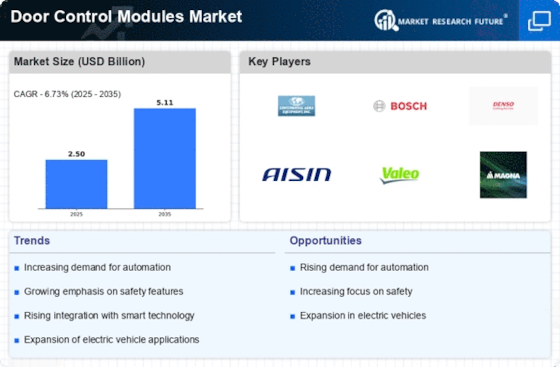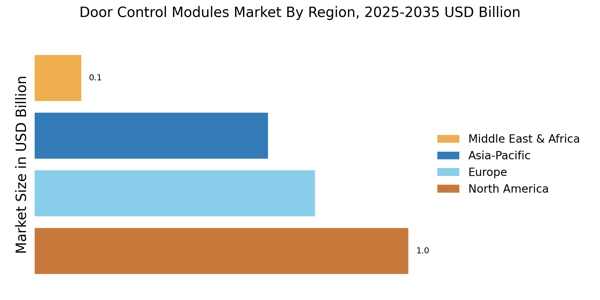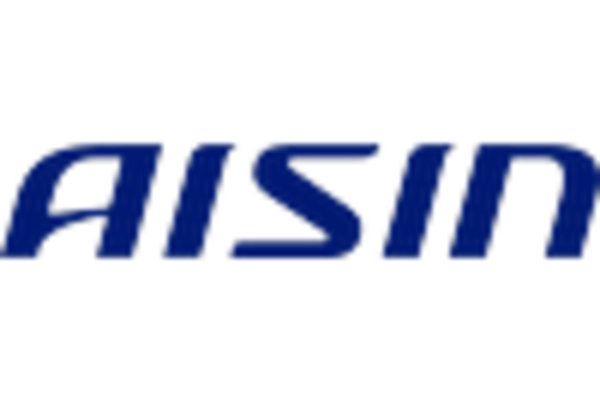Growing Electric Vehicle Market
The Door Control Modules Market is poised for growth due to the expanding electric vehicle market. As the automotive industry shifts towards electrification, the demand for specialized door control systems tailored for electric vehicles is increasing. These systems must accommodate unique features such as battery management and energy-efficient designs. The electric vehicle market is projected to grow at a compound annual growth rate of over 20% in the coming years, driven by consumer interest in sustainable transportation solutions. This growth presents a significant opportunity for the Door Control Modules Market, as manufacturers develop products that cater specifically to the needs of electric vehicle manufacturers and consumers.
Integration of Smart Technologies
The Door Control Modules Market is experiencing a notable shift towards the integration of smart technologies. This trend is driven by the increasing demand for enhanced vehicle connectivity and automation. As vehicles become more sophisticated, the need for advanced door control systems that can communicate with other vehicle components is paramount. The incorporation of features such as remote access, keyless entry, and smartphone integration is becoming standard. According to recent data, the market for smart automotive technologies is projected to grow at a compound annual growth rate of approximately 10% over the next five years. This growth is likely to propel the Door Control Modules Market forward, as manufacturers seek to meet consumer expectations for convenience and security.
Rising Demand for Vehicle Safety Features
The Door Control Modules Market is significantly influenced by the rising demand for vehicle safety features. Consumers are increasingly prioritizing safety in their purchasing decisions, leading to a surge in the adoption of advanced safety technologies. Door control modules play a crucial role in enhancing vehicle safety by integrating features such as automatic locking systems, anti-theft mechanisms, and emergency exit functions. Recent statistics indicate that The Door Control Modules Market is expected to reach USD 200 billion by 2026, reflecting a growing emphasis on safety across all vehicle segments. This trend is likely to drive innovation within the Door Control Modules Market, as manufacturers strive to develop systems that not only meet regulatory standards but also exceed consumer expectations.
Sustainability and Eco-Friendly Solutions
The Door Control Modules Market is increasingly aligning with sustainability initiatives as manufacturers seek to reduce their environmental impact. The automotive sector is under pressure to adopt eco-friendly practices, and door control modules are no exception. Innovations in materials and manufacturing processes are being explored to create more sustainable products. For instance, the use of recyclable materials in the production of door control modules is gaining traction. Additionally, energy-efficient designs that minimize power consumption are becoming a focal point. Market analysis suggests that the demand for sustainable automotive components is likely to grow, with projections indicating a potential increase of 15% in eco-friendly product offerings within the next five years. This shift towards sustainability is expected to reshape the Door Control Modules Market.
Technological Advancements in Manufacturing
The Door Control Modules Market is benefiting from technological advancements in manufacturing processes. Innovations such as automation, robotics, and additive manufacturing are enhancing production efficiency and reducing costs. These advancements allow manufacturers to produce more complex and reliable door control systems while maintaining high quality. Furthermore, the adoption of Industry 4.0 principles is enabling real-time monitoring and data analytics, which can lead to improved product development and customer satisfaction. Recent reports indicate that the automotive manufacturing sector is expected to invest over USD 50 billion in advanced manufacturing technologies by 2027. This investment is likely to have a profound impact on the Door Control Modules Market, fostering innovation and competitiveness.

















